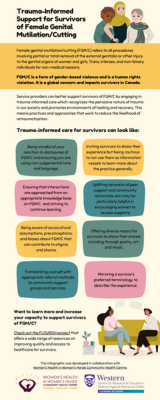Our Work
.
Trauma-Informed Support for Survivors of Female Genital Mutilation/Cutting

Female genital mutilation/cutting (FGM/C) is a form of gender-based violence and is a human rights violation. It is a global concern and impacts survivors in Canada.
Service providers can better support survivors through trauma-informed care. Find strategies in this infographic developed in collaboration with Women's Health in Women's Hands Community Health Centre.
January 2024
Female genital mutilation/cutting (FGM/C) refers to all procedures involving partial or total removal of the external genitalia or other injury to the genital organs of women and girls, Trans, intersex, and non-binary individuals for non-medical reasons.
FGM/C is a form of gender-based violence and is a human rights violation. It is a global concern and impacts survivors in Canada.
Service providers can better support survivors of FGM/C by engaging in trauma-informed care which recognizes the pervasive nature of trauma in our society and promotes environments of healing and recovery. This means practices and approaches that work to reduce the likelihood of retraumatization.
Trauma-informed care for survivors can look like:
- Being mindful of your reaction to disclosures of FGM/C and ensuring you are using non-judgemental tone and language.
- Ensuring that interactions are approached from an appropriate knowledge base on FGM/C and striving to continue learning.
- Being aware of sociocultural assumptions, preconceptions, and biases about FGM/C that can contribute to stigma and shame.
- Familiarizing yourself with appropriate referral methods to community support groups and services.
- Inviting survivors to share their experience but being cautious to not use them as information vessels to learn more about the practice generally.
- Uplifting networks of peer support and community advocates who may be particularly helpful in encouraging women to access supports.
- Offering diverse means for survivors to share their stories including through poetry, art, and music.
- Mirroring a survivor’s preferred terminology to describe the experience.
Want to learn more and increase your capacity to support survivors of FGM/C?
Check out the FLOURISH project that offers a wide range of resources on improving quality and access to healthcare for survivors.
This infographic was developed in collaboration with Women's Health in Women's Hands Community Health Centre.
All our resources are open-access and can be shared (e.g., linked, downloaded and sent) or cited with credit. If you would like to adapt and/or edit, translate, or embed/upload our content on your website/training materials (e.g., Webinar video), please email us at gbvln@uwo.ca so that we can work together to do so.






